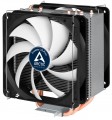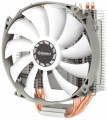Max. TDP
The maximum TDP provided by the cooling system. Note that this parameter is indicated only for solutions equipped with heatsinks (see "Type"); for separately made fans, the efficiency is determined by other parameters, primarily by the air flow values (see above).
TDP can be described as the amount of heat that a cooling system is able to remove from a serviced component. Accordingly, for the normal operation of the entire system, it is necessary that the TDP of the cooling system is not lower than the heat dissipation of this component (heat dissipation data is usually indicated in the detailed characteristics of the components). And it is best to select coolers with a power margin of at least 20 – 25% — this will give an additional guarantee in case of forced operation modes and emergency situations (including clogging of the case and reduced air exchange efficiency).
As for specific numbers, the most modest modern cooling systems provide TDP
up to 100 W, the most advanced —
up to 250 W and even
higher.
Number of fans
The number of fans in the design of the cooling system. More fans provide higher efficiency (all else being equal); on the other hand, the dimensions and the noise generated during operation also increase accordingly. Also, note that other things being equal, a smaller number of large fans is considered more advanced than numerous small ones; see "Fan diameter" for details.
Fan size
The diameter of the fan(s) used in the cooling system.
In general, larger fans are considered more advanced than smaller ones: they allow you to create a powerful air flow at a relatively low speed and low noise level. On the other hand, a large diameter means large dimensions, weight and price. As for specific figures,
40 mm and
60 mm models are considered miniature,
80 mm and
92 mm are medium,
120 mm and
135 /
140 mm are large, and even
200 mm fans are found in the most powerful
case systems.
Bearing
The type of bearing used in the cooling fan(s).
The bearing is the piece between the rotating axle of the fan and the fixed base that supports the axle and reduces friction. The following types of bearings are found in modern fans:
—
Sliding. The action of these bearings is based on direct contact between two solid surfaces, carefully polished to reduce friction. Such devices are simple, reliable and durable, but their efficiency is rather low — rolling, and even more so the hydrodynamic and magnetic principle of operation (see below), provide much less friction.
—
Rolling. They are also called "ball bearings", since the "intermediaries" between the axis of rotation and the fixed base are balls (less often — cylindrical rollers) fixed in a special ring. When the axis rotates, such balls roll between it and the base, due to which the friction force is very low — noticeably lower than in plain bearings. On the other hand, the design turns out to be more expensive and complex, and in terms of reliability it is somewhat inferior to both the same plain bearings and more advanced hydrodynamic devices (see below). Therefore, although rolling bearings are quite widespread nowadays, however, in general, they are much less common than the mentioned varieties.
—
Hydrodynamic. Bearings of this type are filled with a special liquid; when rotate
...d, it creates a layer on which the moving part of the bearing slides. In this way, direct contact between hard surfaces is avoided and friction is significantly reduced compared to previous types. Also, these bearings are quiet and very reliable. Of their shortcomings, a relatively high cost can be noted, but in fact this moment often turns out to be invisible against the background of the price of the entire system. Therefore, this option is extremely popular nowadays, it can be found in cooling systems of all levels — from low-cost to advanced.
— Magnetic centering. Bearings based on the principle of magnetic levitation: the rotating axis is "suspended" in a magnetic field. Thus, it is possible (as in hydrodynamic ones) to avoid contact between solid surfaces and further reduce friction. Considered the most advanced type of bearings, they are reliable and quiet, but expensive.Max. RPM
The highest speed at which the cooling system fan is capable of operating; for models without a speed controller (see below), this item indicates the nominal rotation speed. In the "slowest" modern fans, the maximum speed
does not exceed 1000 rpm, in the "fastest" it can be up
to 2500 rpm and even
more.
Note that this parameter is closely related to the fan diameter (see above): the smaller the diameter, the higher the speed must be to achieve the desired airflow values. In this case, the rotation speed directly affects the level of noise and vibration. Therefore, it is believed that the required volume of air is best provided by large and relatively "slow" fans; and it makes sense to use "fast" small models where compactness is crucial. If we compare the speed of models of the same size, then higher speeds have a positive effect on performance, but increase not only the noise level, but also the price and power consumption.
Max. air flow
The maximum airflow that a cooling fan can create; measured in CFM — cubic feet per minute.
The higher the CFM number, the more efficient the fan. On the other hand, high performance requires either a large diameter (which affects the size and cost) or high speed (which increases the noise and vibration levels). Therefore, when choosing, it makes sense not to chase the maximum air flow, but to use special formulas that allow you to calculate the required number of CFM depending on the type and power of the cooled component and other parameters. Such formulas can be found in special sources. As for specific numbers, in the most modest systems, the performance
does not exceed 30 CFM, and in the most powerful systems it can be up to 80 CFM and even
more.
It is also worth considering that the actual value of the air flow at the highest speed is usually lower than the claimed maximum; see Static Pressure for details.
MTBF
The total time that a cooling fan is guaranteed to run before it fails. Note that when this time is exhausted, the device will not necessarily break — many modern fans have a significant margin of safety and are able to work for some more period. At the same time, it is worth evaluating the overall durability of the cooling system according to this parameter.
Noise level
The standard noise level generated by the cooling system during operation. Usually, this paragraph indicates the maximum noise during normal operation, without overloads and other "extreme".
Note that the noise level is indicated in decibels, and this is a non-linear value. So it is easiest to evaluate the actual loudness using comparative tables. Here is a table for values found in modern cooling systems:
20 dB — barely audible sound (quiet whisper of a person at a distance of about 1 m, sound background in an open field outside the city in calm weather);
25 dB — very quiet (normal whisper at a distance of 1 m);
30 dB — quiet (wall clock). It is this noise that, according to sanitary standards, is the maximum allowable for constant sound sources at night (from 23.00 to 07.00). This means that if the computer is planned to sit at night, it is desirable that the volume of the cooling system does not exceed this value.
35 dB — conversation in an undertone, sound background in a quiet library;
40 dB — conversation, relatively quiet, but already in full voice. The maximum permissible noise level for residential premises in the daytime, from 7.00 to 23.00, according to sanitary standards. However, even the noisiest cooling systems usually do not reach this indicator, the maximum for such equipment is about 38 – 39 dB.
Heatpipe contact
The type of contact between the heat pipes provided in the heatsink of the cooling system and the cooled components (usually the CPU). For more information about heat pipes, see above, and the types of contact can be as follows:
—
Indirect. The classic version of the design: heat pipes pass through a metal (usually aluminium) base, which is directly adjacent to the surface of the chip. The advantage of such contact is the most even distribution of heat between the tubes, regardless of the physical size of the chip itself (the main thing is that it should not be larger than the sole). At the same time, the extra piece between the processor and the tubes inevitably increases thermal resistance and slightly reduces the overall cooling efficiency. In many systems, especially high-end ones, this drawback is compensated by various design solutions (primarily by the tightest connection of the tubes with the sole), but this, in turn, affects the cost.
—
Direct. With direct contact, the heat pipes fit directly on the cooled chip, without an additional sole; for this, the surface of the tubes on the desired side is ground down to a plane. Due to the absence of intermediate parts, the thermal resistance at the places where the tubes fit is minimal, and at the same time, the radiator design itself is simpler and cheaper than with indirect contact. On the other hand, there are gaps between the heat
...pipes, sometimes very large — as a result, the surface of the serviced chip is cooled unevenly. This is partly offset by the presence of a substrate (in this case, it fills these gaps) and the use of thermal paste, however, in terms of uniformity of heat removal, direct contact is still inevitably inferior to indirect contact. Therefore, this option is found mainly in inexpensive coolers, although it can also be used in fairly performant solutions.
